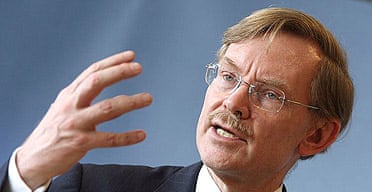The World Bank's governing board today rubber-stamped the appointment of Robert Zoellick as its next president, clearing the way for the US nominee to take up his post at the start of next week.
Mr Zoellick was the only nomination for the job as head of the world's largest development agency, and as expected he was unanimously approved by the representatives of the bank's member governments at a board meeting in Washington.
"In coming to their decision, the executive directors considered that Mr Zoellick brings to the bank presidency strong leadership and managerial qualities as well as a proven track record in international affairs and the drive required to enhance the credibility and effectiveness of the bank," the board said in a statement.
International development agencies called on Mr Zoellick to concentrate the bank's energies on tackling poverty and address the effects of climate change on the world's poor.
"Zoellick must begin a series of reforms in his first 100 days to create a new deal between the bank and the world's poor. We can't continue with business as usual," said Jeremy Hobbs, the executive director of Oxfam International.
The new president takes office with a packed in-tray. His most urgent task will be to convince donors to stump up $36bn (£18bn) to replenish the bank's International Development Association arm, the fund that makes grants and lends funds at preferential rates to low-income countries.
Mr Zoellick's biggest challenge will be mending the divisions outside and inside the bank caused by the controversy over his predecessor, Paul Wolfowitz, who resigned last month after revelations that he had dictated a pay and promotion package for his then girlfriend, Shaha Riza.
Mr Wolfowitz denied that he had acted in bad faith, but his resignation came after weeks of pressure and an internal bank investigation that concluded he had sought to conceal the pay deal from other bank officials.
Mr Zoellick inherits an institution with more than 10,000 staff that lends around $20bn a year, and whose role has expanded widely in recent years to include climate change and gender development alongside its traditional poverty-fighting efforts.
A foreign policy advisor during George Bush's first presidential campaign, Mr Zoellick served in the White House as the US trade representative from 2000, in charge of negotiating the abortive Doha trade round. He later served briefly as Condoleezza Rice's deputy at the state department but resigned abruptly last year.
An experienced diplomat, Mr Zoellick is regarded as a good negotiator, but his skills as an administrator will be tested by the need to rebuild confidence with the bank's staff after the bruising battle over Mr Wolfowitz.
By tradition the World Bank's president is nominated by the US government, while its twin financial institution, the International Monetary Fund, is chosen by European governments.
